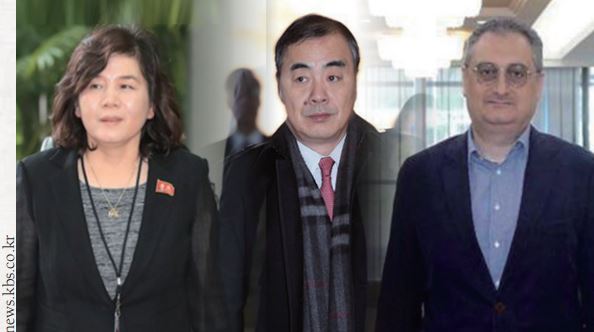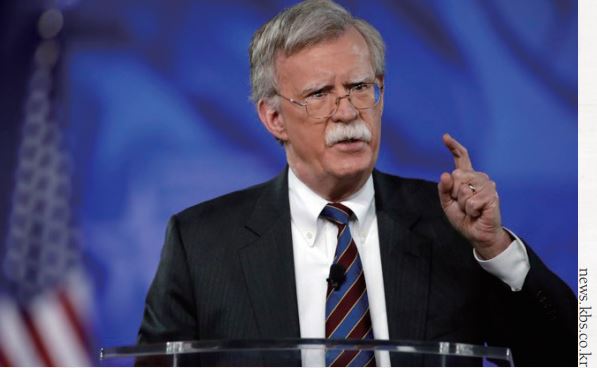After meeting South Korean President Moon Jae-in, United States (US) President Donald Trump said that his second summit with North Korean leader Kim Jongun might be held after the US congressional elections on November 6th. Although the Korean Peninsula has been more peaceful than ever, neighboring powers surrounding the peninsula have different opinions about sanctions on North Korea. Given these circumstances, the Sungkyun Times (SKT) looks through North Korea’s actions in recent international politics, analyzes how powers neighboring the Korean Peninsula see North Korea, and inspects how South Korea, which is at a crossroads, should respond.
North Korea in Recent International Relations
Is North Korea Taking a Step Closer to World Peace for Real?
With its nuclear tests and human rights violations, the world has had a negative perception of North Korea: a country with nuclear weapons, a one-party state in the world, or even a threat to the whole world. Ever since it participated in the 2018 Winter Olympics in Pyeongchang, South Korea, however, North Korean leader Kim Jong-un has made unexpected moves in world politics. Through the inter-Korean summits in 2018, Kim showed his willingness to talk about denuclearization and world peace. Moreover, as an allusion to its shift in diplomatic tone, North Korea kept its intercontinental ballistic missiles (ICBMs) and references to its nuclear power capabilities out of its annual military parade on September 9th. It was the first time that North Korea did not show off ICBMs to provoke the US.
In the meantime, North Korea has been cooperating with China and Russia, which are thought to be the two main allies of the North. On October 9th, Chinese, Russian and North Korean deputy foreign ministers met and discussed their cooperation during North Korea’s denuclearization process. Later, they released a statement that supported North Korea’s “phased and synchronized measures” and called on the United Nations Security Council (UNSC) to adjust the sanctions against North Korea, which was against the US declaration to maintain tough sanctions.

North Korea’s Desire to Become a Normal Country
A country has an independent government with sovereignty which controls a certain spatially defined and bounded area, whose borders are clearly defined and internationally recognized by other countries. On the other hand, although its definition can vary depending on scholars and disciplines, a “normal” country generally means a country that serves as a regional and global player observing international law and norms in the international community. Since North Korea does not meet any of these conditions, almost all countries except for China and Russia do not consider it normal. According to its Constitution, South Korea does not even recognize North Korea as a country but rather as a part of its territory, which is why South Koreans submit visitation verification certificates rather than passports when they visit North Korea. Ever since Kim Jong-un took power in 2012, he has been trying to transform North Korea into a normal country to be recognized by the US and eventually by the entire world. For example, Kim has done things to make himself look more suitable for the global community such as wearing modern suits and holding a lot of high-level talks with leading countries. Additionally, during the important diplomatic meetings with other countries, he has demanded several times that North Korea be treated as a normal country.
Viewpoints from Neighboring Powers
US
The ultimate objective of the US remains the final, fully verified denuclearization (FFVD) of North Korea, which was a term used for the first time by US Secretary of State Mike Pompeo in a Senate hearing in July 2018. In accordance with this goal, Trump stated that sanctions on North Korea would not be reduced until it completed denuclearization. According to a briefing of Treasury Secretary Steve Mnuchin in February 2018, approximately half of the US sanctions against North Korea since 2005 were levied in 2017 under the Trump administration.

Moreover, each expert and party has different opinions regarding the standard of North Korea’s denuclearization. Some people argue that North Korea needs to provide visible progress of sustaining and eventually dismantling its stockpile of highly enriched uranium and plutonium before discussing the intensity of the US sanctions. In the meantime, there are people who think that the US might be able to exchange loosening sanctions on North Korea with its procedure to denuclearize.
Now that President Trump has announced that the 2nd summit with Kim Jong-un would be held after the US midterm elections on November 6th, it remains to be seen if the second meeting will really happen. The prevailing view in the US seems to be that sanctions and pressure on North Korea will continue regardless of the results of the elections. When it comes to the possibility of the next summit between the US and North Korea, however, each politician and newspaper has expressed different opinions.
China and Russia
China and Russia have long been thought to be two long-lasting allies of North Korea. They have taken actions mostly against the US and Japan, inducing changes in North Korean policies in accordance with their national interests. China has not been pressuring North Korea to the point where its regime might collapse or become chaotic. Similarly, Russia has cooperated with North Korea by allowing around 20,000 North Korean laborers to work in Russia. It has also been financially aiding North Korea, taking up about 10% of the total amount of the World Food Programme (WFP)’s food assistance in North Korea from 2010 to 2015. The two countries have expressed positive opinions about the improvement in inter-Korean relations and peace settlement on the Korean Peninsula. When it comes to unilateral sanctions against North Korea, however, they seem to be on the opposite side of the US, claiming to lift or at least to loosen the unilateral sanctions. The Chinese foreign ministry stated that the UNSC should consider an adjustment of its sanctions against North Korea in accordance with the peaceful shift in interKorean relations. Similarly, Russian Foreign Minister Sergey Lavrov urged for the lifting of sanctions against North Korea given the readiness for cooperation that North Korea had shown. In short, both ideas of China and Russia are to check the US as it has been trying to directly intervene in East Asia these days.
Japan
Historically, Japan has followed the US policy in North Korea because of its strategic alliance with the US. For instance, the Obama administration’s foreign policy strategy towards North Korea was “strategic patience”, which was to wait for Kim Jong-un’s regime to put effort into giving up on its nuclear weapons without intervening. At that time, Japan had enough reasons to intervene in issues on the Korean Peninsula instead of the “strategically patient” US. Japanese Prime Minister Shinzo Abe would emphasize North Korea as a threat to Japan for two main reasons, its abductions of Japanese citizens in the past and missiles that might threaten its territory, and to help quash political corruption scandals that could harm his regime. Lately, however, since the two Koreas have been steering toward peace on the Korean Peninsula while President Trump has been trying to directly intervene in East Asia, Japan has fewer reasons to be involved in Korean issues. As a result, Abe has changed his stance all of a sudden. Given the current changes in international relations, in his speech at the United Nations General Assembly (UNGA) on September 25th, Abe expressed his willingness to talk with Kim Jong-un and stabilize ties with him.
Tasks Left Ahead for South Korea
Because the Korean Peninsula is facing different interests and political goals of neighboring powers, it is time that South Korea examines long-term problems to be solved.
Clarification of the Meaning of “Denuclearization”
As mentioned before, the meaning and the process of North Korea’s denuclearization can vary from country to country; South Korea has not made it clear either. For example, the Pyongyang Joint Declaration of September 2018 includes “denuclearization of the Korean Peninsula,” not of North Korea. It is also written that North Korea will permanently dismantle the nuclear facilities in Yeongbyeon “as the US takes corresponding measures,” which can be ambiguous regarding the timing of completing North Korea’s denuclearization. In other words, the two Koreas have not made it clear if North Korea would actually denuclearize in a visible way. Regarding the meaning of denuclearization of North Korea, US Senator Ben Cardin of Maryland said that the US needed properly demonstrated progress toward the denuclearization of North Korea. He added that there should be more realistic plans and standards on North Korea’s denuclearization that other countries can agree with.
A Wider Range of Inter-Korean Agreements
Inter-Korean talks have mainly focused on military matters like the denuclearization of North Korea, abolishing ballistic missiles, and a call to formally end the Korean War.

Regarding the situations that North Korean citizens are in, however, problems that violate universal values, such as North Korea’s woeful human rights or domestic malnutrition, need to be dealt with more urgently than anything else in further meetings. In particular, prolonged starvation is one of the most serious problems that North Koreans have been going through; according to the WFP, more than 10 million people, which is nearly 40% of the population, are malnourished. Conditions related to prison camps, media control, or the freedom of religion, show that North Korea’s human rights record has been the worst in the world. In regard to such human rights problems in the North, the Korean government has shown its willingness to deal with them in further inter-Korean talks; at the 73rd session of the UNGA, President Moon mentioned that there should be a holistic approach embracing peace, development, and human rights to resolve humanitarian crises in countries like North Korea. In addition to these human rights issues, the government needs to regularly discuss the reunification of divided families during high-level talks with the North.
Depoliticization of North Korean Policies
One of the most significant characteristics of Korean politics is that the conservatives and the liberals have been in stark confrontation with each other when it comes to inter-Korean issues. Lately, after several high-level talks with North Korea, the democratic ruling party praised the government’s achievements and wants to discuss reactivating the inter-Korean Kaesong Industrial Complex. The conservative opposition parties, however, think that the government needs to slow down the pace. In particular, as Korean politicians have limited terms, they tend to use North Korean policies as a way of capturing more voters regardless of their effectiveness, which means that they tend to politicize North Korean policies. To prevent policies toward the North from being used as political tools, there is a foreign affairs and unification committee at the National Assembly of Korea that consists of politicians from both the ruling party and the opposing party. Since the members of the committee, however, have not reached agreements on bills that can be related to political interests and are still likely to represent the political ideologies of their parties, there needs to be further discussions on how to stop North Korean policies from being politicized.
North Korea may be South Korea’s closest neighbor, but most of the time, it seems difficult to predict and understand its intentions. Now that the world has been witnessing the peaceful shifts in the Korean Peninsula, however, it is necessary for the South Korean government to grasp the political interests of the Peninsula’s neighboring powers and predict what is best for the country. By slowly but steadily communicating with each other, the two Koreas might find a diplomatic breakthrough and eventually get closer to peace on the Peninsula.
